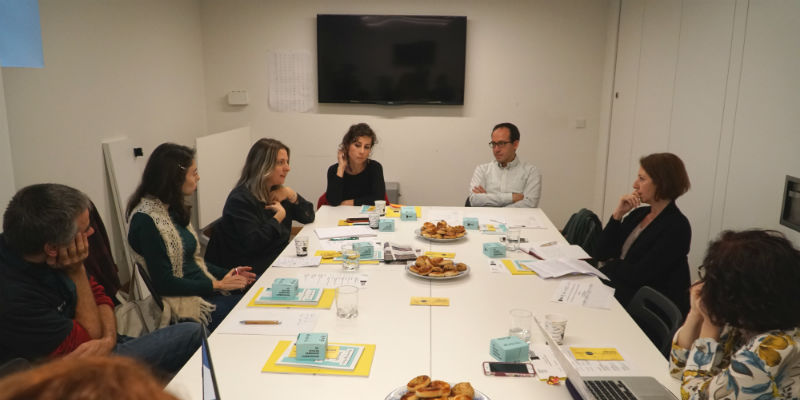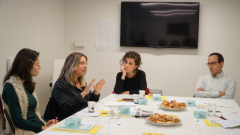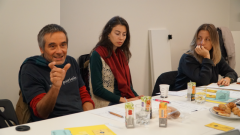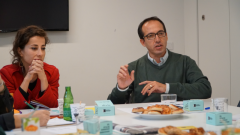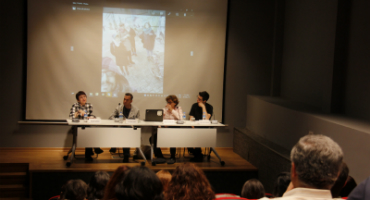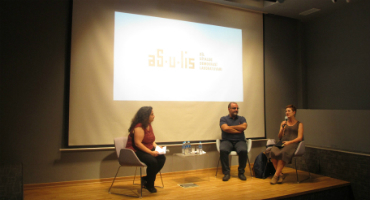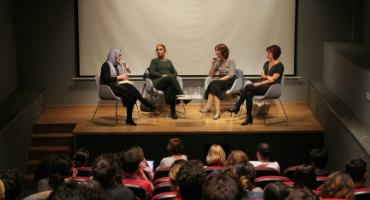On October 24, 2017, a round table meeting was held in Hrant Dink Foundation with the participation of journalists, people from alternative media platforms, artists, playwrights, NGO representatives, academics and people of letters from Turkey and Peter Molnar. During the meeting, facts, experiences, suggestions and observations concerning especially the role of art and media in combating hate speech and discrimination were exchanged and possible practices for combating hate speech and discrimination were discussed.
The participants were the following: PhD candidate Caitlin Miles studying on journalism in Turkey; Zeynep Kunt who writes a thesis on Theater of the Oppressed and potentials of participatory theater for social dialog and also works for a project on cultural heritage and voices in Sulukule carried out with the participation of locals; author Burhan Sönmez who is a member of Pen Turkey and Pen English; independent stage actress Zuhal Güreli who carries out works on women’s rights; Yeşim Özsoy who is the founding director of “And Other Stuff Company” (Ve Diğer Şeyler Topluluğu) which is an Istanbul-based theater company engaged in new texts, new technologies and interdisciplinary topics, and also the founder of the performance venue GalataPerform; Aslı Karaca who is a PhD candidate at Central European University in the field of women studies; Özlem Altınok who is the coordinator of the Speak Up Platform (Susma Platformu) which is a platform working on the fields of art and media with the purpose of organizing concerted actions against censorship, self-censor, marginalization, witch-hunt, emotional lynching and of finding pluralist and effective solutions; and Peter Molnar who is Research Affiliate on Freedom of Speech at the Center for European Enlargement Studies at Central European University where he was one of the founding researchers of the Center for Media and Communication Studies in 2004 and a writer, slammer, voluntary radio host, participatory theater director and activist.
Nefret Söylemi ile Mücadelede Sanat ve Performans çalıştayı
20171124_fuaye_asulis_sanatveayrimcilik_slider3.png
20171124_fuaye_asulis_sanatveayrimcilik_slider2.png
20171124_fuaye_asulis_sanatveayrimcilik_slider1.png
The discussion was started with the question of hate speech and discrimination in Turkey and Europe and Burhan Sönmez stated that discriminatory discourse and hate speech is common in many places from Turkey to the US and populist discourse is rising. Pointing out that majority of people supports politicians who use an unacceptable language and discriminatory discourses take root in our daily lives because of that, Sönmez argued that we have to think about to what extent political discourse is affecting the daily life. Claiming that authors can shape their discourses in consideration of feedback from their readers while they are trying to realize their creative potential, Sönmez stated that artists should impose certain limits to themselves.
Zuhal Güreli said that the state is the fountain head of the discriminatory discourse and hate speech targeting women.
Talking about her own experiences, Yeşim Özsoy pointed out that artists are always on alert because of the censorship in Turkey. She added that even though artists resort to self-censor because of this, self-censor may be regarded as a stance against censorship as well.
Participants talked about their observations and experiences as part of the discussion on the question how art and media can be used as a means in struggle against hate speech and discrimination.
Stating that prejudices start in one’s family and close circle, Aslı Karaca talked about how art helped her to confront the prejudices that both she and her circle have. She said that since she participated in Peter Molnar’s Hate Speech Monologues, she had the opportunity to express herself and to touch and hear other people by sharing a common place with them, and thus she had the chance to change herself. Claiming that people get the opportunity to share their personal stories through Hate Speech Monologues, Peter Molnar stated that this enables those stories to be taken to public sphere and to become visible. Stating that he reached many people through his online slam poetry performances between New York and Budapest and the people he interacted with are not homogenous groups, Molnar claimed that participatory art performance gives way to conversation. During the discussion, it was emphasized that such heterogeneous groups have an important role in facilitating mutual transformation in conflict resolution.
Claiming that the increase in science-fiction and dystopia literature in Turkey and many other places in the world is a way of communication, Burhan Sönmez stated that science-fiction literature written by new generations is a great instrument in conflict resolution. Claiming that nothing can be concealed in novel genre, Sönmez emphasized the importance of the criticisms by the readers on this point and stated that this should be the case in politics and society should have the freedom to criticize policymakers.
Drawing from the plays that she wrote, Özsoy stated that we should also listen to the argument suggested by the other and she pointed out that we have to tolerate people instead of transforming them. She stated that the real question is the difficulty of communication and tolerance, but theater and humor are important instruments in this regard.
During the round table meeting, the roles of participatory art, performance and media in combating hate speech and discrimination had been discussed and prospective ideas and suggestions for forming new collaborations were put forward.


